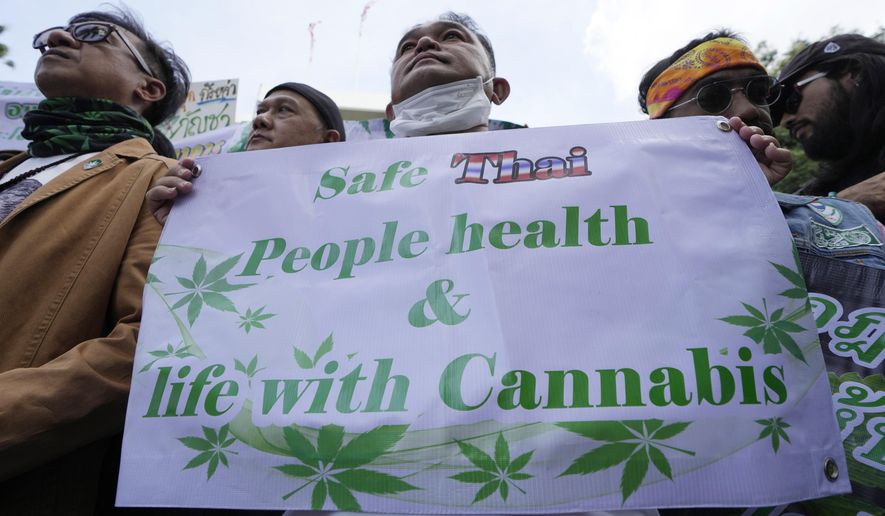BANGKOK — Cookies, the popular San Francisco-based cannabis and fashion company, marked the opening of its first Asian franchise in Thailand on Jan. 21 with a Buddhist monk’s blessings, a Muay Thai boxing demonstration and ceremonial drumming, all within sight of the U.S. Embassy.
The razzmatazz included someone wielding a handheld, long-barreled “leaf blower” pumping bountiful cannabis smoke into eager mouths among hundreds of Thais and foreigners waiting for hours in warm winter sunlight.
Yet the good times — and the expectation of better times to come — can’t hide the financial risk Cookies and other would-be entrepreneurs face in Thailand’s tricky and rapidly shifting cannabis market and in the country’s equally tricky political arena.
The legalization movement that attracted worldwide interest could be snuffed out if anti-cannabis opposition politicians win elections for parliament and prime minister — possibly as early as May.
As in the U.S., legalization of cannabis has been a stop-and-start affair, with officials hoping to cash in on Thailand’s reputation for producing some of the highest-quality pot on the market but with restrictions on distribution and sale that stop far short of a free and legal market.
The laws legalizing cannabis have been criticized as vague, loosely interpreted and irregularly enforced. They allow licensed, laissez-faire sales of cannabis — but not extracts of tetrahydrocannabinol (THC) or hashish — to anyone not younger than 20 or pregnant.
Some shops label every strain “medical cannabis” in an effort to quell concerns about recreational sales. Police can arrest tokers, but only for “pollution” if someone complains about second-hand smoke.
Among those celebrating Cookies’ Bangkok opening was Thai cannabis entrepreneur Julpas “Tom” Kruesopon, who feels protective of the fledgling market in cannabis and its potential to grow.
“I wrote the law, I got it legalized,” Mr. Julpas told guests and workers at the opening of Cookies Thailand, saying he has a half-interest in the store. “I was the one who suggested they legalize cannabis.”
Last year, Mr. Julpas partnered with a Las Vegas-based cannabis company, Audacious, and created Herbidus Medical Center in Bangkok.
It was the first foreign franchise to jointly open a medical marijuana clinic in Thailand.
Pot and politics
The fate of weed in Thailand may depend on the course of the coming election, which could bring major changes after an extended rule by authoritarian Prime Minister Prayuth Chan-ocha, who came to power in a military putsch and whose government pushed through the measure to decriminalize cannabis.
The opposition Pheu Thai (For Thais) Party and its allies vow to return cannabis to its illegal “narcotic” status. That includes imprisonment for use, possession, cultivation and sales unless controlled by Health Ministry officials for clinically diagnosed patients or medical research.
“Over 1 million patients and farmers who use and grow cannabis for medical purposes will be affected,” said pro-cannabis House member Parnthep Pourpongpan.
Pheu Thai’s de facto leader is fugitive multimillionaire and former Prime Minister Thaksin Shinawatra. Mr. Thaksin fled Thailand to avoid a sentence for corruption after he was toppled in a bloodless 2006 military coup. While in power, his government pursued a bloody “war on drugs” that critics said included serious judicial and human rights violations.
Mr. Thaksin’s sister Yingluck Shinawatra was elected prime minister in 2011. She also became a fugitive abroad after a court found her guilty of corruption. The military coup that brought Mr. Prayuth to power dissolved her coalition in 2014.
The Pheu Thai Party’s leadership now includes Mr. Thaksin’s daughter, Paethongtan Shinawatra. If Pheu Thai wins, Ms. Paethongtan is widely expected to bring her father back to Thailand and target the Prayuth government’s policies, including cannabis legalization.
Mr. Prayuth is running for reelection, but many say his eight-year hold on power is in question after he left the ruling Palang Pracharath Party this month to run for a fledgling new party. He reportedly made the move after a power struggle with Deputy Prime Minister Prawit Wongsuwan, a military comrade for decades who took over the Palang Pracharath Party three years ago.
Political handicappers are keeping an eye on Health Minister Anutin Charnvirakul, who enthusiastically pushed for legalizing cannabis. Mr. Anutin’s political base includes farmers hoping to profit from cannabis in this mostly agricultural nation.
If Mr. Anutin’s Bhumjai Thai wins big in parliamentary elections, he may become a candidate for prime minister or be a kingmaker in a coalition government.
He insists that posturing anti-cannabis politicians are trashing his efforts to create a profitable industry because they need to defeat him in the polls.
Even if the next government makes cannabis illegal again, Cookies hopes to survive.
“Cookies is a fashion and accessories brand that represents the cannabis community. So whether cannabis is available, or it can be sold or not, we still have the product line, we still have the following,” company Asia General Manager Andreas Pergher said in an interview.




Please read our comment policy before commenting.